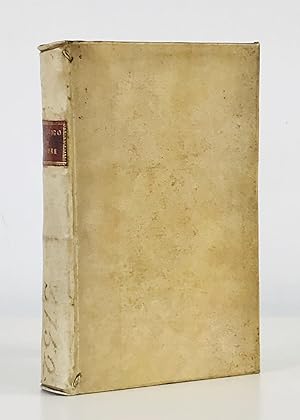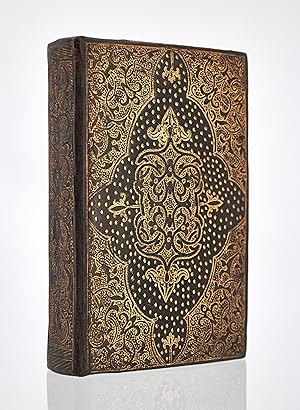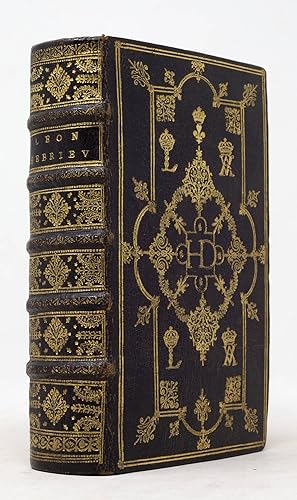abravanel judah (7 résultats)
Type d'article
- Tous les types d'articles
- Livres (7)
- Magazines & Périodiques
- Bandes dessinées
- Partitions de musique
- Art, Affiches et Gravures
- Photographies
- Cartes
-
Manuscrits &
Papiers anciens
Etat
- Tous
- Neuf
- Ancien ou d'occasion
Reliure
- Toutes
- Couverture rigide (6)
- Couverture souple
Particularités
- Edition originale (3)
- Signé
- Jaquette
- Avec images (5)
- Sans impression à la demande
Pays
Evaluation du vendeur
-
Dialogues D'Amour: the French translation attributed to Pontus de Tyard and published in Lyon, 1551, by Jean de Tournes (The original edition is entitled simply "De l'amour" and carries the following epigraph: "Pour voir ce Ciel, auquel je prins naissance, Derme devient ma legere inconstance."
Edité par The University of North Carolina Press, Chapel Hill, 1974
ISBN 10 : 0807870595ISBN 13 : 9780807870594
Vendeur : Henry Hollander, Bookseller, Los Angeles, CA, Etats-Unis
Livre
Hardbound. Etat : Very Good. Octavo, light blue cloth with gold lettering, 328 pp., glossary, table of proper names. An ex-library copy with ink-stamps and a small label but no other markings. Introductory material in English. The text itself is in a French translation. Edited, with an introduction and notes, by T. Anthony Perry.
-
Seder Hagadah shel Pesah: mevu'arah im asarah be'urim mi-ge'one olam ha-nod'im le-shem ule-tehilah: . a) P. Rashi: b) Rashbam: g) Ritva: d) Gevurot H. (meha-gaon Maharal mi-Prag): h) Olelot Efrayim .
Edité par Be-Defus Ha-Almanah veha-Ahim Rom, Vilna, 1873
Vendeur : Henry Hollander, Bookseller, Los Angeles, CA, Etats-Unis
Hardbound. Etat : Good. Octavo, brown leather spine with minor wear at the spine ends, edgeworn marbled paper covers, front endpaper cracked at the hinges, 76 pp. Text is in Hebrew.
-
Diálogos de León Hebreo
Edité par Padilla Libros (Seville), 1989
ISBN 10 : 8487039170ISBN 13 : 9788487039171
Vendeur : Palimpsest Scholarly Books & Services, Brooktondale, NY, Etats-Unis
Livre Edition originale
Hardcover. Etat : Fine. 1st Edition. Facsimile of 1590 edition by Pedro Madrigal. Translation by Inca Garcilaso de la Vega, with introduction and notes by Miguel de Burgos Núñez. Hardcover volume, measuring approximately 7.5" x 10", is in fine condition, with solid binding, clean and bright interior. 63/313/[62] pages. Originally published as "La traduzion del Indio de Los tres dialogos de amor de Leon Hebreo," this work by Portuguese Jewish medieval philosopher, physician, and poet Judah Leon Abravenel (c.1460-c.1530) is considered one of the most important philosophical works of its time, with its significant ties to Plato's concept of dialogue, and as one of the first original philosophical compositions to be published in the vernacular (as opposed to Latin).
-
Ma'aleh Bet Horin, Ve-hu Seder Hagadah Shel Pesah/ Hagadah Shel Pesah, ke-Minhag Ashkenazim ukhe-Minhag Sefaradim [THIRD EDITION OF THE AMSTERDAM HAGGADAH, MISSING THE MAP]
Edité par Yaccov Proops, Amsterdam, 1781
Vendeur : ERIC CHAIM KLINE, BOOKSELLER (ABAA ILAB), Santa Monica, CA, Etats-Unis
Hardcover. Etat : g-. Third edition. Quarto. [2] 52 double-sided leaves. Rebacked in modern brown leather spine over original period brown leather boards. Gilt lettering and ruling on the spine. Modern endpapers. Profusely illustrated throughout with copperplate engravings. Includes both an initial illustrated title page with copperplate engravings surrounding the text (Ma'aleh Bet Horin) and a printed title page with decorative woodblock borders and the publisher's device. In addition to the Hebrew text, a few sections throughout are in Judeo-German (Yiddish) printed in Vaybertaytsh script. This third edition of the famous Amsterdam Haggadah, found the work reformatted into a smaller size, and saw the title officially changed to Maleh Beit Horin (meaning "house free men"). Most of the same famous copperplate engravings by Abraham ben Jacob (aka Abraham bar Yaccov), that previously appeared in the 1695 and 1712 editions, are retained here. The two images added to the 1712 second edition are included (the illustrated order of the Seder, and the complete ten plagues), but four of the full series of images included in the first two editions are not present. These missing images are Abraham smashing the idols of his father, Moses receiving the Ten Commandments a Mount Sinai, Moses and Aaron coming to Pharaoh, and the Holy Temple in Jerusalem.* In our copy the engraved title and three other other engravings contain contemporary hand-coloring (the rabbis of Bene Brak, the Four Sons, the angels visiting Abraham). The text of this third edition replaces the complete running commentary from Isaac Abravanel of the earlier editions, with 3 additional text commentaries. These include the "Gevurot Hashem" from the Maharal of Prague (Judah Loew ben Bezalel), writings by Rabbi Moshe Alshich, and "Olelot Ephraim", a collection of ethical homilies by Rabbi Shlomo Ephraim Luntschitz. However Abravanel's commentary is present following Yishtabach through the end of the Seder, and in the initial six-leaf section preceding the text of the Passover seder which discusses the laws of Passover. This copy is lacking the original engraved map of the Holy Land at the rear, as it was originally issued. Binding with some rubbing and abrasions to the original boards and spine. Interior with heaving staining to pages throughout, with text still legible. Biding and interior in in good- condition overall. Hebrew title: × ×¢× ×" × × ×ª × × × × × , × ×"× × ×¡×"× ×"× ×"×" × × ×¤×¡× Alternate Hebrew title: ×"× ×"×" × × ×¤×¡× : × × ××"× × × × ×× × × × × × ××"× ×¡×¤× ×"× × Publication: × ×¢×§× ×¤× × ×¤×¡, × × × × × ×"× , ×ª×§× "× Alternate transliterations: Ma'ale Bet Horin, Ma'ale Beit Khorin, Ma'ale Beit Chorin, Ma'ale Beit Horin, Bibliographic references: Yaari 199, Vinograd: Amsterdam 2113, Yudlov 300, Yerushalmi: Plate 75 *This contravenes the statement made by Yerushalmi (Plate 75) that all of the engravings of the previous editions are retained.
-
DIALOGHI DI AMORE, COMPOSTI PER LEONE MEDICO Di Natione Hebreo, et Dipoi Fatto Christiano
Edité par Venice Aldus 1545, 1545
Vendeur : Christian White Rare Books Ltd, Ilkley, YORKS, Royaume-Uni
Livre
The second Aldus edition of these three influential dialogues on love, heavily dependent on cabalistic philosophy. Eighteenth century pigskin binding, external straps, head and tail of spine and a morocco label, with turned-in flaps to edges of boards. Old continental heraldic bookplate on front pastedown, partly torn. Soiling to title page but otherwise a very good copy that collates complete: [ff]2 ff262. A couple of old ink annotations to margins; final upper outer trianglular corner (1x1cm)of colophon leaf torn off. In these dialogues the author tried to reconcile Aristotle and the Neoplatonists and achieving considerable success in doing so. Cervantes points to the book's influence: 'Do you have to talk about love as long as you know four words of the Italian language, you will find in León Hebreo to fill the mark.' - Don Quixote. Some marginal handwritten annotations from the 16th century. Adams A61 Please contact Christian White Rare Books Ltd for more information or images of this item.
-
Couverture rigide. - Guillaume Rouillé, Lyon 1551, petit in-8 (10,5x17,5cm), 675 pp. (44 p.), relié. - Édition originale de la traduction française des Dialoghi d'amore donnée par Denis Sauvage, sieur du Parc. La page de titre est ornée d'un très bel encadrement gravé sur bois d'après une composition de Pierre Vase. Très belle impression lyonnaise en caractères italiques, avec lettrines et ornements. Exemplaire entièrement réglé de rouge, 28 lignes par page. Reliure lyonnaise de l'époque, dos lisse entièrement restauré richement orné d'arabesques et pointillés dorés, plats ornés en leur centre d'un grand motif typographique doré sur fond de pointillés dorés, larges arabesques et entrelacs en écoinçons, toutes tranches dorées et ciselées d'arabesques végétales. Ex-libris de la bibliothèque de James Toovey encollé sur le premier contreplat, celui de Samuel Putnam Avery réalisé par le peintre et graveur anglais Charles William Sherborn collé sur la première garde, tampon à sec de la bibliothèque Gianni de Marco sur la garde suivante. Deux ex-libris manuscrits anciens sur la page de titre. Libraire et éditeur, James Toovey (1813-1893) fut également un important bibliophile. Il acquit la bibliothèque du château de Gosford, en Irlande du Nord, en 1878. Après sa mort, ses livres furent vendus en partie aux enchères en 1894, alors que son fils en garda une autre partie qui fut vendue ensuite en 1899 à M. J. Pierpont Morgan, fondateur de la Morgan Library de New York. Samuel Putnam Avery (1822-1904), marchand d'art et connaisseur fut nommé commissaire chargé du département des arts américains de l'Exposition Universelle à Paris. Fondateur et pendant longtemps administrateur du Metropolitan Museum of Art de New York, il fut également un grand collectionneur d'estampes et d'ouvrages rares établis dans de superbes reliures. Cet ouvrage de grande facture, l'une des plus belles réalisations de l'imprimerie lyonnaise alors à son apogée, est emblématique d'une période charnière de l'histoire de la langue française renaissante, deux ans après la publication de la Défense et illustration de la langue française de Joachim du Bellay. La traduction de Denis Sauvage, dédiée à Catherine de Médicis, fait date dans l'histoire de la langue française. Correcteur de l'éditeur Guillaume Rouillé, Sauvage se convertit un temps à la Réforme et fut - à l'instar de Froissart et de Commines - l'historiographe du roi Henri II. Particulièrement sensible à la réforme de la langue française il n'hésita pas dans cet ouvrage à inventer de nombreux néologismes. Ce sont au total plus d'une centaine de mots qui sont ainsi répertoriés dans le glossaire qu'il dresse à l'attention du lecteur en fin de volume. Plusieurs de ces termes ont d'ailleurs aujourd'hui été adoptés par l'usage?: astuce, bénévole, dimension, immédiatement (contrairement à médiatement), moteur, etc. L'éditeur Guillaume Rouillé, formé à l'imprimerie à Venise, fut quant à lui l'un des premiers en France à se conformer aux règles de l'orthographe modernisée que Ronsard venait de préconiser quelques mois plus tôt. Judah Abravanel (ou Léon l'Hébreu, 1460-1521), cabaliste juif refusant de se convertir au christianisme, fut contraint en 1492 de quitter la Castille pour Gênes où il exerça la médecine. Ses dialogues contribuèrent, avec ceux de Marsile Ficin, à la diffusion en France d'un néo-platonisme étroitement lié au mouvement humaniste. Les poètes du cénacle lyonnais puis ceux de la Pléiade accueillirent avec enthousiasme la Philosophie d'amour. On en retrouve en outre un exemplaire parmi les 105 volumes répertoriés de la bibliothèque de Montaigne qui s'amusera de l'immense succès du texte?: «?Mon page faict l'amour, lisez-luy Léon Hébreu et Ficin.?» Son influence traversera pourtant le temps, un siècle plus tard Spinoza lui empruntera le concept d'amour intellectuel de Dieu. Bel et rare exemplaire, établi dans une luxueuse reliure lyonnaise de la Renaissance et ayant notamment appartenu à Samuel Putnam Avery, fondateur du 675 pp. (44 p.).
-
Leon Hebrieu de l'Amour
Edité par Jean de Tournes, Lyon, 1551
Vendeur : Arader Books, New York, NY, Etats-Unis
Edition originale
Hardcover. Etat : Near fine. First. A FINE FRENCH ROYAL "RELIURE D'AMOUR" -- THE ROCQUENCOURT--FIRMIN DIDOT--BORDES --HOE--GANAY COPY Two volumes in one. Lyon: Jean de Tournes, 1551. Octavo (6 3/8" x 3 15/16", 162mm x 100mm). [Full collation available.] With two wood-engraved vignettes (one on each title page) and a wood-engraved printer's device (dd4v) in addition to several head- and tail-pieces. Bound (at least partly in the workshop of Louis-Antoine Boyet, active 1698-1733) in deep brown morocco. On the boards, all gilt, "HD" monogram at the center within a lobed square, each lobe with a fermesse (also "S fermé" or "closed S," not unlike $); set within a scrollwork scalloped lozenge surmounted with a coronetted fleur-de-lys; flanking the lozenge the coronetted initials L (viz. Louis XIII) and counterchanged A's (viz. Anne of Austria) top-and-bottom; set within a double-fillet lobed rectangular panel with fleurs-de-lys at the corner of each lobe (the left and right lobes scalloped, with a fleur-de-lys at the join), and with scrollwork corner-ornaments; pointillé corner-fleurons; all set within a double fillet border with rosettes at the corners. On the spine, five raised bands with a floral roll gilt. Panels gilt. Author gilt to the second panel. Gilt floral roll to the edges of the boards, continued at the inside dentelle. Marbled end-papers. All edges of the text-block gilt. Near fine, with some rubbing at the edges of the raised bands and hinges. A little split to the upper fore-corner of the front board. Light even tanning throughout. Ruled in sanguine throughout. A very few marginalia in an early hand (T4v offsetting to T5r, T6v), partially trimmed. Armorial ex-libris of de Rocquencour, the small label of Hubert de Ganay and an octagonal (shelf?) label "KKb" to the front paste-down (with "No 202" written in graphite at the bottom). Partially obliterated shelf-label (printed ?]4,102 with 202 written in graphite at the top) to the verso of the front free end-paper. Booksellers' notes to the verso of the front free end-paper, the recto of the initial binder's blank and the recto of the rear free end-paper. Leo the Hebrew, as he is called in English (Leone Ebreo in Italian; Leon l'Hébreu or, as here, Hebrieu in French), born Judah Leon Abravanel (or Abrabanel) ca. 1460 in Lisbon, was a poet and a philosopher who relocated to Italy (including the courts of Naples, Genoa and Florence). His Dialoghi d'amore (first edition 1535) explores philosophy through the lens of love, philo-sophia being love of wisdom. The dialogue -- here between Philo and Sophia -- as a structure descends from Socrates via Plato; from Boethius through the medieval and early modern period, the dialogue as a rhetorical device allows the author a great deal of flexibility in the presentation of viewpoints. The Dialoghi were popular, being translated into Hebrew, Latin, Spanish (there is lingering confusion over the language of the work's composition) and, as here, French before long, long agreed to be the work of Pontus de Tyard. Standing on the shoulders both of renaissance Neoplatonism and of medieval courtly romance, the work might be read on many levels, whence its appeal. At the very heart of the allure of this storied copy of Tyard's translation -- otherwise quite rare; only one copy beside the present one has ever come to auction; seven copies are recorded in institutional libraries -- is its binding. [Please inquire for an extensive analysis of the binding as well as of later provenance.] To summarize the provenance evidence of the binding: the HD (whether a single person or a pair) at center of the boards is still unknown, but may have been active in either the first or last quarter of the XVIIc, and may predate the rest of the decorated binding. The Louis XIII-Anne of Austria surround likely does not date from their reign, but instead that of Louis XIV (though why is unclear). Adams A58; Brunet III.984; Olivier-Hermal-Roton XXV, pl. 2493 (and illust. 9).


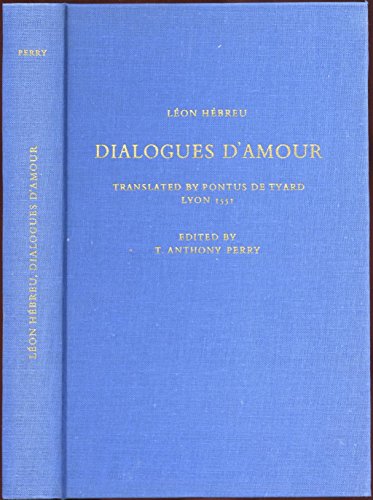

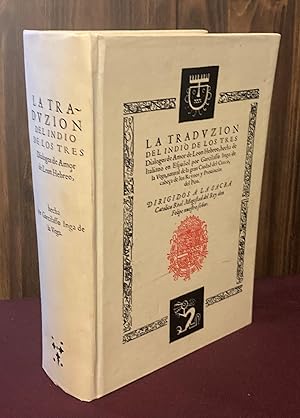
![Image du vendeur pour Ma'aleh Bet Horin, Ve-hu Seder Hagadah Shel Pesah/ Hagadah Shel Pesah, ke-Minhag Ashkenazim ukhe-Minhag Sefaradim [THIRD EDITION OF THE AMSTERDAM HAGGADAH, MISSING THE MAP] mis en vente par ERIC CHAIM KLINE, BOOKSELLER (ABAA ILAB)](https://pictures.abebooks.com/inventory/md/md6950182198.jpg)
